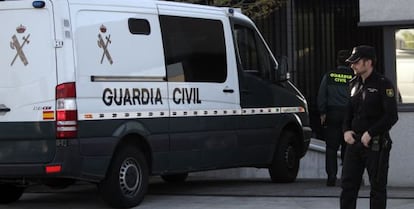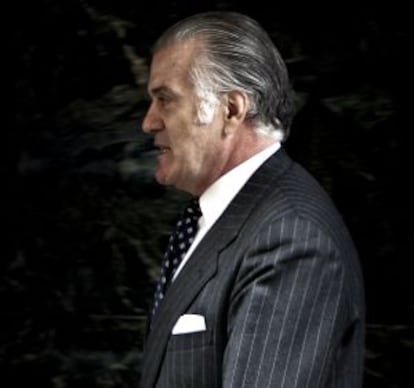Disgraced PP treasurer says ex-minister gave him access to secret cash accounts
Luis Bárcenas tells judge that Francisco Álvarez-Cascos oversaw party’s undeclared slush fund

A former treasurer for the ruling Popular Party (PP) who is a key element in a complex corruption case on Thursday claimed that a former minister gave him access to the party’s undeclared cash accounts.
Luis Bárcenas, who is under scrutiny for a variety of crimes including tax evasion, money laundering and accepting bribes, told investigating judge Pablo Ruz that Francisco Álvarez-Cascos, a former public works minister and ex-secretary general for the PP, personally handed him the key to a secret box containing money that did not appear in the party’s official accounting.
According to several sources who were present at the High Court hearing, Bárcenas said that this handover occurred after his predecessor, Rosendo Naseiro, was arrested in 1990 in connection with illegal party financing.
According to this version of events, Álvarez-Cascos supervised the inflow of money to the hidden accounts. In January 2013, EL PAÍS published parts of these secret ledgers, which were handwritten by Bárcenas himself. They suggest that the PP accepted illegal donations from construction firms and other businesses who wanted favorable treatment when government contracts were awarded, and used the money to pay cash bonuses to party officials, among other things.
Sources close to Álvarez-Cascos told EL PAÍS that they had never heard this “story” before and fell back on the former minister’s statements to this same judge in August, when he denied ever having any oversight of the party’s finances.
This is Bárcenas’ 12th appearance before a judge since 2009
In additional revelations to Judge Ruz, Bárcenas said that the PP had parallel accounts “in all provinces and regions,” and that the treasurers for each territory were in charge of them. The cash boxes were only used during campaigning, he added.
“The secretaries general had oversight of the financing system, and the party presidents were aware of it,” he testified, according to legal sources who were present at the Thursday hearing.

Bárcenas noted that this system of illegal financing even extended to the municipal level, and he cited the Madrid outlying towns of Majadahonda, Pozuelo and Las Rozas as examples of this practice.
He also said that the current speaker of the Valencia parliament, Juan Cotino, handed the party €300,000 on March 11, 2004 to finance Mariano Rajoy’s run for general elections. According to Bárcenas, donors would “fall over themselves” to give the party money during campaign runs.
To a question over the alleged donation of €200,000 to fund María Dolores de Cospedal’s bid to become premier of Castilla-La Mancha in 2007, Bárcenas insisted that the construction company Sacyr (which held the garbage-collection contract in Toledo) did pay out this amount, in breach of party-finance legislation that says that government contractors are barred from donating. De Cospedal is currently the PP secretary general as well as serving as premier of Castilla-La Mancha.
Bárcenas also told the judge that Ángel Acebes, a major figure within the center-right party who served as justice minister and secretary general, was aware of these parallel accounts.
This latest testimony by Bárcenas comes after the former treasurer, who has been held in preventive custody since June of last year, offered to provide new information on the issue. This is the 12th time that he has appeared before a judge since the Gürtel kickbacks-for-contracts scandal broke in 2009. Since then, Bárcenas — who has been described as a walking time bomb because of all the information in his power — has been coming out with new revelations in carefully measured doses. Once a powerful figure within the PP, Bárcenas’ fall from grace over Gürtel derived into a bitter public dispute with his former party. In February 2013, he filed formal complaints against the PP for unfair dismissal and for allegedly breaking into his own former office and stealing two personal computers.
Besides his involvement in the Gürtel case, Bárcenas is also under investigation for the personal fortune of €48 million that he was found to have stashed away in Swiss bank accounts, and which investigators suspect may have come from the PP’s secret slush fund. So far, Bárcenas is denying this claim and saying that the money came from art sales and successful investments in the stock market.
During his July testimony before the judge, Bárcenas admitted to being the author of the handwritten ledgers and offered detailed information about the financial crimes committed between 1990 and 2008, while, he claims, he was under orders from his bosses.
Tu suscripción se está usando en otro dispositivo
¿Quieres añadir otro usuario a tu suscripción?
Si continúas leyendo en este dispositivo, no se podrá leer en el otro.
FlechaTu suscripción se está usando en otro dispositivo y solo puedes acceder a EL PAÍS desde un dispositivo a la vez.
Si quieres compartir tu cuenta, cambia tu suscripción a la modalidad Premium, así podrás añadir otro usuario. Cada uno accederá con su propia cuenta de email, lo que os permitirá personalizar vuestra experiencia en EL PAÍS.
En el caso de no saber quién está usando tu cuenta, te recomendamos cambiar tu contraseña aquí.
Si decides continuar compartiendo tu cuenta, este mensaje se mostrará en tu dispositivo y en el de la otra persona que está usando tu cuenta de forma indefinida, afectando a tu experiencia de lectura. Puedes consultar aquí los términos y condiciones de la suscripción digital.








































